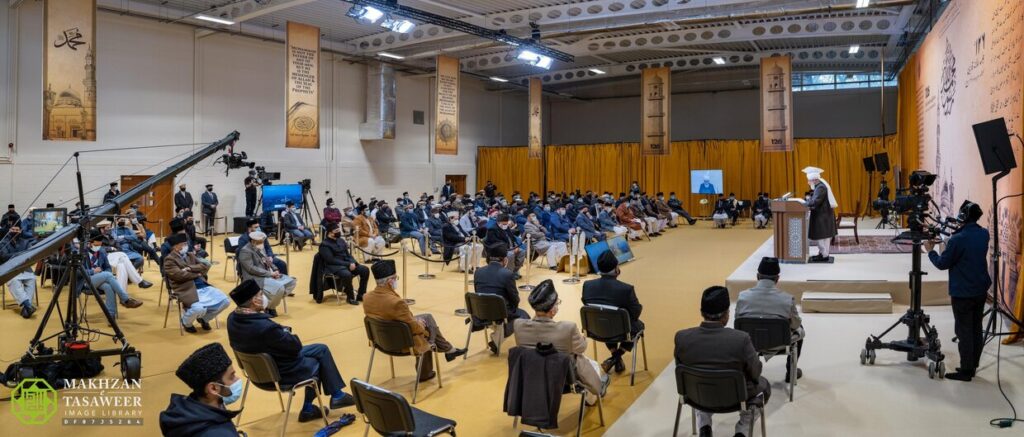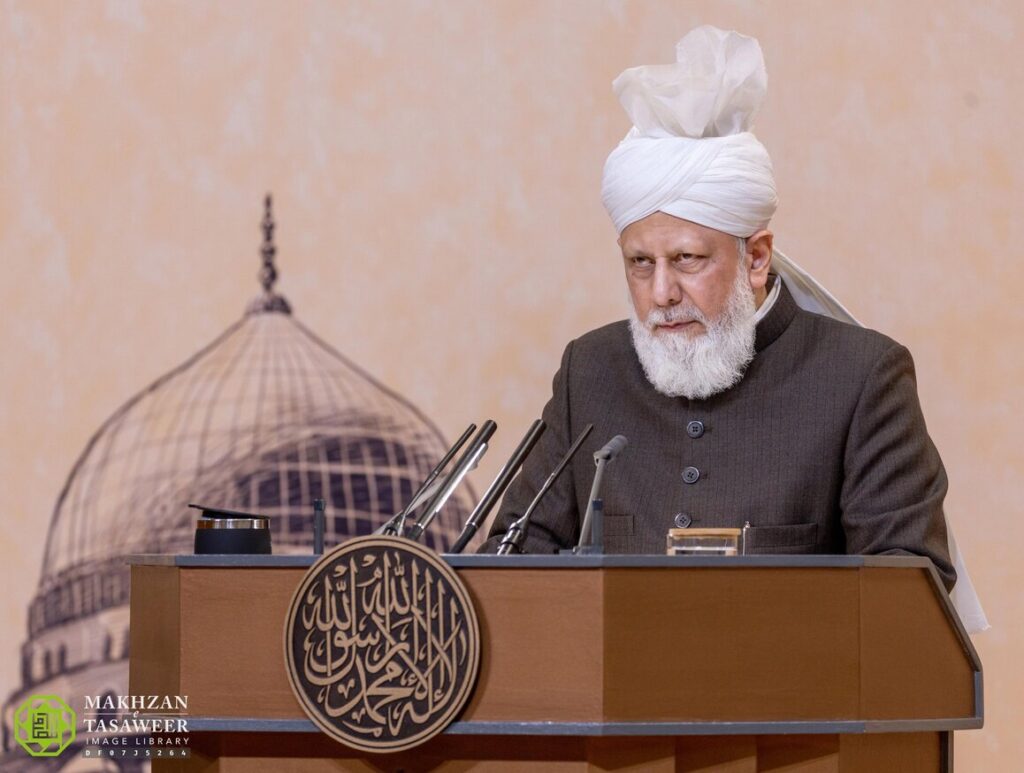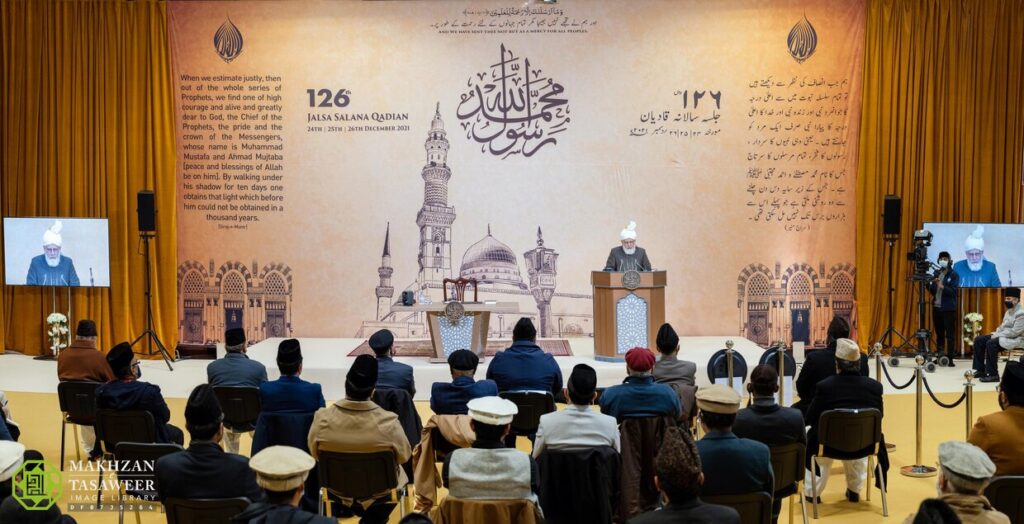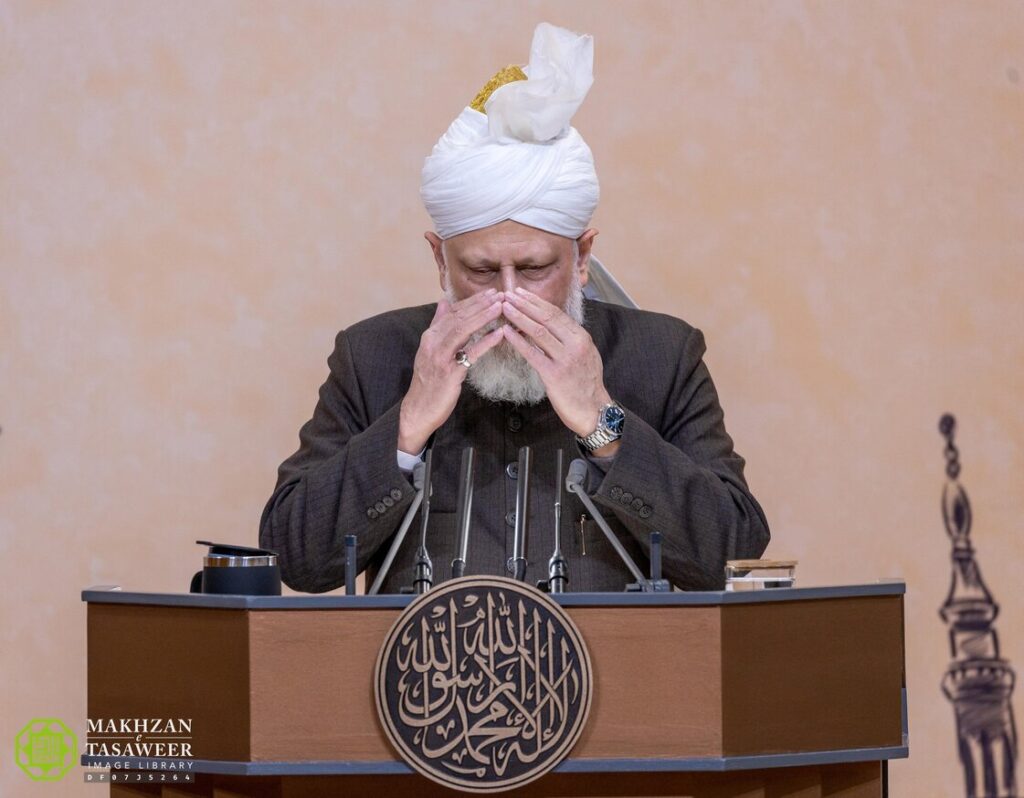
Islamabad, UK, 26 December 2021: At 10:32 am, Hazrat Khalifatul Masih Vaa arrived at the Masroor Hall, Islamabad, UK for the concluding session of Jalsa Salana Qadian 2021.
Through MTA International, a live feed was set up between Islamabad, UK and those attending Jalsa Salana in Qadian, India. Ahmadis across the world also tuned in through MTA for Huzoor’s concluding speech.
After his arrival, Huzooraa invited Mahmud Ahmad Wardi Sahib to recite a portion of the Holy Quran and its Urdu translation. Umar Sharif Sahib was called to recite a poem of the Promised Messiahas.
Hazrat Khalifatul Masih Vaa then took to the podium to deliver the concluding address of Jalsa Salana Qadian 2021.
After reciting tashahud, ta‘awuz and Surah al-Fatihah, Hazrat Khalifatul Masihaa said that it was the last day of Jalsa Salana Qadian and that Guinea-Bissau Jamaat was also holding its Jalsa and requested permission to be included in the final session. Huzooraa noted other jamaats were holding jalsas too around the world.
Hazrat Amirul Momineenaa said that we claimed Islam was the most perfect teaching and if one followed it, the most beautiful and harmonious society would be created. Islam’s teachings took man closer to God Almighty and for this, it instructed mankind to uphold the rights of others.
Huzooraa said nowadays, a lot of discussions took place on peace and establishing it; however, from the local to the international level, chances of rebellion, disorder and fighting were increasing. Even Covid-19 did not eradicate such dire conditions of nations and this “warning” from Allah was not heeded, and if no true change took place, “very dangerous consequences will arise”.
Huzooraa said he was going to relate some aspects of Islamic teachings on establishing peace and harmony in the world. Huzooraa said he would narrate them in light of Quranic teachings.
Regarding religious freedom, Huzooraa said even in today’s age, people attacked and mocked other religions, especially Islam. However, Islam condemned attacking the prophets of other religions. Islam does claim to be the right religion; however, it does not say the prophets and religious leaders of other religions were false.
Drawing on a verse of the Quran, Huzooraa said Muslims are taught to “accept that in every nation, prophets have come, and if prophets have come in every nation, then how can one say, ‘Your prophet’ is false?” Huzooraa said other religious people, at times, made – or could make – indecent allegations against the Holy Prophetsa. However, a Muslim would always refer to the prophets and leaders of other religions with respect.
The Promised Messiahas said he did not say the inception and basis of every religion were false. He praised the holy men of other religions and accepted their truthfulness. However, over time, these religions saw their teachings being interpolated and were therefore tampered with. The Promised Messiahas emphasised the Holy Quran said that:
“[…] and there is no people to whom a Warner has not been sent.”
Therefore all religions should be respected and their leaders too.
An erroneous concept that has been spread about Islam and its history is that Islam is a religion of violence and extremism. However, “This has no basis at all”. The Holy Quran strictly condemns any kind of coercion or force in religion.
Huzooraa said Allah declared in the Holy Quran that if He wanted, the whole of humanity would have forcefully had to believe. However, He did not do this. If Allah did not force anyone to believe, then neither did the Holy Prophetsa or Islamic teachings force anyone to believe. Allah said Islam was a true religion and teaching – if one wanted to believe, they could; if not, then that would be their choice and they would be reckoned by Allah in the Hereafter. There was no compulsion in religion.
Huzooraa said due to the inaccurate and wrong commentaries of some Muslim scholars, the notion of forced conversions or compulsion took root; however, this is not what the Holy Quran or the Prophetsa taught.
The Holy Quran spoke of the disbelievers who thought that if they accepted Islam, the enemies of Islam would persecute and destroy them. But Allah said to look at the protection and peace He gave to the people of Mecca and not to fear the enemy. Huzooraa said the salient point in these verses showed that the disbelievers feared non-Muslim tyrannical leaders, not Islam.
“It is with great shame that the Muslim nations of today have not understood this and wrong concepts about Islam are being spread that, God forbid, it is an extremist religion that spreads disorder too.
“If the actions of Muslims today become according to these [true] teachings, then the world will begin to focus on Islam. And Muslims will see themselves too that by turning to God truthfully and by abandoning worldly gods, where the peace of the world will be established, the respect and honour and dignity of Muslims will also increase.
“And this will happen when the true servant of the Holy Prophetsa and the Imam of the Age will be accepted.”

Huzooraa presented another teaching of the Holy Quran. This teaching was about either forgiving or punishing wrong acts. The Holy Quran declared:
وَ جَزٰٓؤُا سَيِّئَةٍ سَيِّئَةٌ مِّثۡلُهَا ۚ فَمَنۡ عَفَا وَ اَصۡلَحَ فَاَجۡرُهٗ عَلَي اللّٰهِ ؕ اِنَّهٗ لَا يُحِبُّ الظّٰلِمِيۡنَ
“And the recompense of an injury is an injury the like thereof; but whoso forgives and his act brings about reformation, his reward is with Allah. Surely, He loves not the wrongdoers.” (Surah al-Shura, Ch.42: V.41)
This was a teaching that gave insights into various actions people should take. Firstly, enmity should not last forever; rather, the purpose was reformation. That is why, in this verse, Allah said to only take the recompense that was due. However, one needed to look at what course of action was needed – to punish, to take recompense or to forgive. Allah said that if reformation was achieved by forgiveness, then the person should be forgiven.
The main emphasis was on reformation and positive change. This teaching of the Holy Quran created a revolution in the era it was revealed where enmity and anger against one another would last for long times. However this hatred and enmity amongst people – that lasted for a long time – existed today as well, Huzooraa said.
If you want to establish peace, then it is through this teaching.
“If the world adopts this teaching, then true peace will be established in the world and unsolicited enmity and hatred will be removed.”
Another golden rule of the Holy Prophetsa was to be empathetic to both the oppressor and the oppressed. Empathy to the oppressor was to stop them from committing injustices. Therefore, lasting peace would only be established when both parties were addressed.
Huzooraa said Islam strongly opposed thinking ill of others. This immoral deed led to disorder in the world and eradicated peace. The Holy Quran taught:
يٰۤاَيُّهَا الَّذِيۡنَ اٰمَنُوا اجۡتَنِبُوۡا كَثِيۡرًا مِّنَ الظَّنِّ اِنَّ بَعۡضَ الظَّنِّ اِثۡمٌ ۖ وَّلَا تَجَسَّسُوۡا وَلَا يَغۡتَبۡ بَّعۡضُكُمۡ بَعۡضًا ۚ اَيُحِبُّ اَحَدُكُمۡ اَنۡ يَّاۡكُلَ لَحۡمَ اَخِيۡهِ مَيۡتًا فَكَرِهۡتُمُوۡهُ ۚ وَاتَّقُوا اللّٰهَ ۚ اِنَّ اللّٰهَ تَوَّابٌ رَّحِيۡمٌ
“O ye who believe! avoid most of suspicions; for suspicion in some cases is a sin. And spy not, nor back-bite one another. Would any of you like to eat the flesh of his brother who is dead? Certainly you would loathe it. And fear Allah, surely, Allah is Oft-Returning [with compassion][and]is Merciful.” (Surah al-Ahzab, Ch.49: V.13)
This verse taught that through suspicion and thinking ill of others, people began looking for and seeking the faults of others. Huzooraa said the Companionsra of the Holy Prophetsa would be extremely careful with suspicion and would always think good of others. They upheld extremely high standards and thought good of others at all times.
Hazrat Musleh-e-Maudra once narrated how a companion thought good of others (husn-e-zan). The incident he narrated also exemplified the high standards of truthfulness and honestly the Companionsra held and how enemies turned to friends.
During the era of Hazrat Umar’sra Khilafat, a person was accused of murder and the court case began. The judge gave a ruling against the person and he was given capital punishment. The man said that he had lots of possessions of orphans and requested the court that he be permitted to return the possessions for a few days, before his punishment. When he was asked to give a guarantee that he would return, he looked around and pointed to a companion of the Holy Prophetsa, Hazrat Abu Dharra and said he would be the guarantor for his bail. When Hazrat Abu Dharra was asked if he would give the guarantee for the person, he agreed to it. When the day arrived for the person to return, some of the companions got worried as the time was ending for the person to return for his punishment.
The companions asked Hazrat Abu Dharra if he knew the person, to which he said that he did not know him personally. The companions said that it was peculiar and asked why he had given the guarantee for a person who committed murder without even knowing him. They said that if he did not return, then Hazrat Abu Dhar’s life was at stake. To this, Hazrat Abu Dharaa said, “I do not know him, but how could I reject the bail request of a Muslim who gave my name as the guarantor. And how could I think ill of him?”
“This was the standard of thinking positive of others that the Companionsra had”, Huzooraa said. Hazrat Abu Dharra became the guarantor only because he did not wish to think ill of the person; that he would not return and go against his promise.
Nevertheless, when the time for the person’s return was imminent, people saw a dust cloud rising in the distance and a person riding very fast on a horse. The person came rushing back. He apologised for the delay and said he was held up in returning the possessions he was holding onto for the orphans. He thanked God that he returned within the time frame and said he was ready for the punishment.
This had such a profound effect on the victims that they told the judge that they forgave that person.
Huzooraa said these were those people “who did not know suspicion”. They would forgive even the hardest of enemies and always think positively of others.
In the above verse, Allah said, “And spy not, nor back-bite one another” – backbiting caused disorder and hatred in society and was akin to eating the flesh of one’s brother. These are the standards that Islam upholds for peace in society, Huzooraa stressed.
The Promised Messiahas said that people thought a certain action was harmless and did not know it was a sin and would carry out that sinful act their whole lives, without the cognisance of knowing its harm. For example, backbiting was such a deed prevalent amongst people.
Huzooraa presented another verse of the Holy Quran:
وَ لَا تَاۡكُلُوۡۤا اَمۡوَالَكُمۡ بَيۡنَكُمۡ بِالۡبَاطِلِ
“And do not devour your wealth among yourselves through falsehood.” (Surah al-Baqarah, Ch.2: V.189)
With reference to the above verse, Huzooraa said that through deception, people wrongfully usurped the wealth of others.
“This injustice is taking place at an international level – rich nations are wrongfully – through deception and excuses – usurping the wealth of poor nations.
“Now, some African countries have begun to raise voices” that after giving them freedom, rich countries continued to take the wealth of poor countries in the name of “development” for those poor countries. Millions of dollars every year were being taken from the poor nations and this had caused a lot of resentment amongst poorer nations for those rich nations, as this money was not spent on the poorer nations. This could have severe consequences, Huzooraa said.
Some businesses, Huzooraa said, thethe form of oppression too. This even included some small businesses and their injustices harmed the peace of the world. The Quran said:
وَيۡلٌ لِّلۡمُطَفِّفِيۡنَ۔ الَّذِيۡنَ اِذَا اكۡتَالُوۡا عَلَي النَّاسِ يَسۡتَوۡفُوۡنَ۔ وَ اِذَا كَالُوۡهُمۡ اَوۡ وَّزَنُوۡهُمۡ يُخۡسِرُوۡنَ
“Woe unto those who give short measure. Those who, when they take by measure from other people, take it full. But when they give by measure to others or weigh to them, they give them less.” (Surah al-Tatfif, Ch.83: V. 2-4)

Huzooraa said Islam cursed those who usurped the rights of others. They had different standards for themselves and others. Huzooraa said that Islam was certainly a beautiful teaching but these teachings in today’s day and age are not being practised by Muslims.
However, “Ahmadis, who have accepted the Promised Messiahas, should establish such examples; the examples that the Companionsra established. […] Our difference should be seen clearly”.
The Companionsra of the Holy Prophetsa upheld very high standards.
Giving an example, Huzooraa said that once, a companion went to the market to sell a horse and set its price at 200 dinars. In the market, another companion said he wanted to purchase the horse, but said its worth was not 200 dinars; rather, it was worth 500 dinars. The companion who was selling it said it was not worth 500 dinars; rather, it was 200 and a quarrel about this matter broke out. Huzooraa said one should ponder over the nature of this quarrel as both companions were aiming to give proper measure according to what they believed to be true. These were the standards set by the Companionsra that they even began to argue so that the other got his proper measure.
Huzooraa said to imagine how much peace would exist in such a society where people like these Companionsra existed. In today’s day and age, people would laugh at such an incident and talk about how the buyer could have just taken a good deal without any question. However, the companion could not bear acting against any teaching of the Holy Quran.
“However in today’s day and age, we observe that the richer the person, the more greed they have”, and try to short-change others. This was the same between rich and poor nations – the rich try to usurp the wealth of poor countries. Huzooraa said voices had been raised now by poorer countries. For example, products that were sold for higher prices in rich countries due to the cheap labour from poorer countries angered those in poorer countries.
Huzooraa said these sentiments of resentment in poorer nations could have very severe consequences. That is why Islam taught to always give proper measures in business transactions etc.
Islam strongly opposed arrogance too. Allah the Almighty declared in the Holy Quran:
وَ لَا تَمۡشِ فِي الۡاَرۡضِ مَرَحًا ۚ اِنَّكَ لَنۡ تَخۡرِقَ الۡاَرۡضَ وَ لَنۡ تَبۡلُغَ الۡجِبَالَ طُوۡلًا
“And walk not in the earth haughtily, for thou canst not rend the earth, nor canst thou reach the mountains in height.” (Surah Bani Israil, Ch.17: V.38)
Allah the Almighty questioned why someone was arrogant. Humans could only exist from what was on the earth and were helped by other humans. If these provisions did not exist, no one could progress. Therefore those who possessed such arrogance should ponder over the fact that they were nothing without the help of those they looked down on. Therefore Allah said not to look down and disrespect others. By being strict, arrogant and looking down on others, the results would be that the poor would rebel against such people. This created disorder in countries too, Huzooraa said, and riots etc. would break out.
“No true station can be reached through arrogance; it is humility that provides true leadership”, Huzooraa said. It was this leadership that would then establish peace in the world.
Another ill was to distort the morals of a nation. Allah said:
لَا يُحِبُّ اللّٰهُ الۡجَهۡرَ بِالسُّوۡٓءِ مِنَ الۡقَوۡلِ اِلَّا مَنۡ ظُلِمَ ۚ وَكَانَ اللّٰهُ سَمِيۡعًا عَلِيۡمًا
“Allah likes not the uttering of unseemly speech in public, except [on the part of] one who is [being] wronged. Verily, Allah is All-Hearing, All-Knowing.” (Surah al-Nisa, Ch.4: V.149)
In the commentary of this verse, Hazrat Musleh-e-Maudra said that even those who were wronged should not be uttering unseemly speech in public. The verse reminded those who were wronged to go to the relevant authorities and get their justice and not to speak unseemly speech in public. Allah reminded that the person who was wronged should not become the transgressor themselves. They should not spread disorder in public and look at their own condition too.
Another Quranic verse presented by Huzooraa was:
وَ اعۡبُدُوا اللّٰهَ وَ لَا تُشۡرِكُوۡا بِهٖ شَيۡئًا وَّ بِالۡوَالِدَيۡنِ اِحۡسَانًا وَّ بِذِي الۡقُرۡبٰي وَ الۡيَتٰمٰي وَ الۡمَسٰكِيۡنِ وَ الۡجَارِ ذِي الۡقُرۡبٰي وَ الۡجَارِ الۡجُنُبِ وَ الصَّاحِبِ بِالۡجَنۡۢبِ وَ ابۡنِ السَّبِيۡلِ ۙ وَ مَا مَلَكَتۡ اَيۡمَانُكُمۡ ؕ اِنَّ اللّٰهَ لَا يُحِبُّ مَنۡ كَانَ مُخۡتَالًا فَخُوۡرَا
“And worship Allah and associate naught with Him, and show kindness to parents, and to kindred, and orphans, and the needy, and to the neighbour that is a kinsman and the neighbour that is a stranger, and the companion by your side, and the wayfarer, and those whom your right hands possess. Surely, Allah loves not the proud and the boastful.” (Surah an-Nisa, Ch.4: V.37)
This verse taught to worship Allah alone and none else – i.e. to believe in the Oneness of Allah. When one was established on tawhid, then they would transgress on the rights of others. Allah then gave a list of those whose rights should be especially upheld – this included everyone who one came into contact with within society. Allah showed the importance of these relations too. At the end of the verse, Allah warned that He did not love those who were “proud and the boastful”.
Huzooraa said that many quarrels, fights and disorders took place in society due to anger. When someone got angry, disruption usually erupted in society. One should not get so angry that they get completely submerged into it and there’s no way out. There should be a limit to both anger and love. Too much love also resulted in injustices.
The attribute of a true Muslim was:
وَالۡكٰظِمِيۡنَ الۡغَيۡظَ وَالۡعَافِيۡنَ عَنِ النَّاسِ
“[…] and those who suppress anger and pardon men”. (Surah Al-e-Imran, Ch.3: V.135)
Huzooraa said Muslims were those who suppressed their anger and forgave others:
“It is this rule that paints a picture of a true Muslim. It is this rule which eradicates enmities, it is this rule which creates an atmosphere of forgiveness and forbearance in society and it is this rule which creates peace and harmony in society.”
The Promised Messiahas said that when one got angry and lost their temper, all their intellect would diminish. In the state of anger, darkness was born. The person who was strict and who got angry would never be able to speak with wisdom. He said that anger and wisdom could not coincide and a person seasoned in anger would never be able to speak with wisdom. Every situation should be looked at – only when anger was necessary should it be used.
Another teaching of the Holy Quran was:
اِنَّ اللّٰهَ يَاۡمُرُ بِالۡعَدۡلِ وَ الۡاِحۡسَانِ وَ اِيۡتَآئِ ذِي الۡقُرۡبٰي
“Verily, Allah enjoins justice, and the doing of good to others; and giving like kindred.” (Surah al-Nahl, Ch.16: V.91)
Huzooraa said that if this teaching of the Holy Quran was truly implemented then peace and harmony would be established at every level of society in an astonishing manner. Justice should be given, but to the extent that one was wronged. Some people would demand a reaction that was not just and that exceeded the bounds of proper recompense.
Many big nations in the world lacked this justice and would often completely cripple other nations due to an offence.
“And giving like kindred” meant that people should treat everyone as they did their family. They should not consider their own personal wants and benefits when treating others. Giving to family was the love that a mother had for her child – it was unconditional love. Allah instructs humanity to develop this unconditional love. Instead of just thinking about taking, one should focus on giving.
When such rules and morals are followed, a wonderfully harmonious and peaceful society would be born.
True peace could only be established by following the commandments of Allah. Huzooraa said this was extremely important for every Ahmadi Muslim to follow and said the rest of the Muslim world should also follow this.
Huzooraa prayed for all the attendees of Jalsa Salana Qadian, Guinea-Bissau and those of other jalsas around the world.

Before leading everyone in silent prayer, Huzooraa said to especially pray that Allah may protect the Jamaat from every harm and that we may uphold the bai‘at in its true manner.
Huzooraa reported that 2,118 were present in the Jalsa gah of Qadian, India and eight countries were represented there. There were those sitting in locations outside of the Jalsa gah in Qadian too.
Hazrat Amirul Momineenaa then permitted taranay (choral poems) to be recited.
In the end, Huzooraa conveyed his salaam and Jalsa Salana Qadian 2021 came to a successful end.
(Report prepared by Al Hakam)

